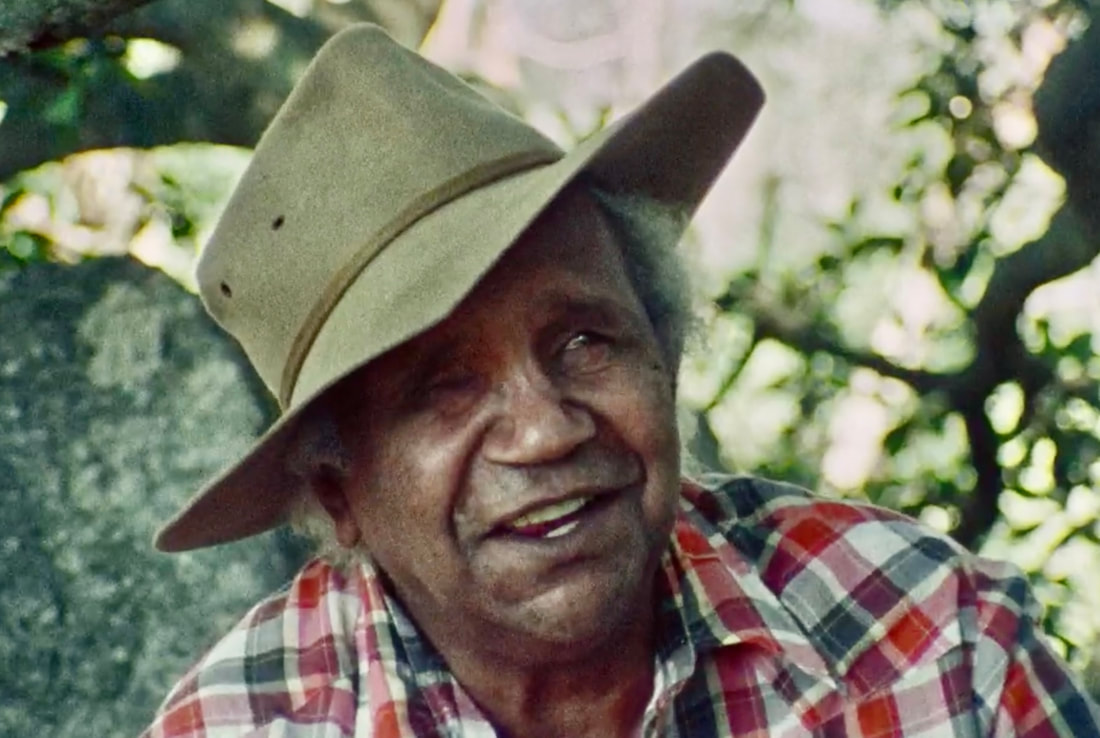|
If you’ve heard ‘The Old Rugged Cross’ played on the gumleaf, you never forget it. I first heard it standing under the ghost gums that stood stark white against the ochre walls covered in the rock art of the Ngemba people. I was leading a tour group at Mt Gundabooka, a rugged range that lies like a goanna on the horizon South of Bourke. The musician was Bill Reid, a pastor of the United Aboriginal Mission, who winked at me from under the tilted brim of his Akubra, quietly selected a leaf, cupped it between his knotted shearer’s hands and began to play. The intrigued tour group eagerly gathered around. That moment is etched in my mind – Pastor Bill, white haired and erect, playing a song of Christian faith in a canyon that had echoed to clapsticks and corroboree of Aboriginal people for many centuries. When he was a young man in 1939, he had met Bill Ferguson and become involved in the Aborigines Progressive Association. In 1938 Ferguson had led the Day of Mourning in Sydney, Australia’s first public civil rights protest and as a result has been called by some, ‘Australia’s Martin Luther King’. Bill Reid remained at his side for more than a decade. During World War II a muscular Bill joined Jimmy Sharman’s boxing troupe, touring around Australia. He was never one to pull his punches. In 1992 he composed a country and western-style song voicing his own and his people’s pain; ‘You introduced your alcohol, to sap us of our will. To gain possession of our land, you even stooped to kill’ (Koorie Mail 1993, 6). In 1983, not long after I arrived in Bourke, a documentary titled A Lousy Little Sixpence was produced, featuring testimonies of Aboriginal people who had experienced the harsh removal of family members by the Protection Board. When I watched it again recently, I was startled to hear it open with the quavering sound of the gum leaf. I recognised the song and the player immediately. The film is composed of sobering eyewitness accounts, honestly told. It features the gentle voice of Bill Reid, telling of how he joined Bill Ferguson on a tour of the north coast missions and reserves to recruit members and rally support for the association. My attention was caught recently by a journal article that said, ‘Cultures may survive without attention, but to flourish, they need to be tended and nurtured with space to evolve and develop to add new layers, while acknowledging the past.’ The author went on to say that storytelling was one of the best ways to do to do this. She urged undertaking the task of ‘interrogating history and locating those who were once left out.’ (Julianne Schultz. Griffith Review Nov 2017) I recommend you watch ‘A Lousy Little Sixpence.’ You’ll see the producers have done that well by allowing Bill Reid and others to relay their experiences as people who’d been left out of our histories. Several of them along with Bill, were people of faith. In the years following, Bill Reid was active in retrieving the Kamilaroi language by building vocabulary lists, talking on Aboriginal culture to school and community groups, giving interviews to newspapers, serving as a local pastor, campaigning for low-cost housing and carving beautiful designs into emu eggs. The National Museum of Australia holds a set of sixteen of his art works. When the producers used Pastor Bill’s gum-leaf-hymn, I don’t reckon they realised that it was more than a novelty. I know he had an excursion away from faith but in the end, the cross was a vital part of his narrative. He’d owned its message of redemption, in spite of the injustices done to his people, sometimes by Christians. It set me interrogating the commentary on this sad chapter of Australian history, asking why the Christian faith of leaders like Bill Ferguson, Margret Tucker and Bill Reid, was largely ignored. They openly acknowledged it as one of the reasons for their resilience. I believe if we want our culture to flourish, we need to recognise that the tested faith of these people gives honesty and balance to the narrative. I was honoured when, thirty years ago, Bill asked me to conduct his funeral service in Bourke, where he was a highly respected citizen. Twenty-five years went by before a headstone was erected on his grave by a Jewish friend. Into the granite, he had a local Aboriginal craftsman carve the words of Bill’s favourite verse from the Bible. It stands as an enduring testimony for future generations to the hopeful, half-forgotten music that had changed his life. I AM WHAT I AM BY THE GRACE OF GOD. (I COR 15:10)
3 Comments
1/9/2024 05:11:24 pm
Again your beautifully crafted words have informed my mind and touched my heart. Your posts are important to me as they “fill in the blanks” for this Australian born “Canadian” who left home over fifty years ago. Thank you, old friend.
Reply
Vaila. Thanks. Glad to send a bit of eucalyptus across the Pacific. Telling Bill Reid’s’s story was a sacred trust. I hope it touches hearts and reminds people how important it is to listen to the past carefully. Another Aboriginal pastor gave me a saying which people love.
Reply
1/9/2024 09:26:54 pm
I’m always grateful to accidentally come across your posts in the middle of the night. They bring the past and present together for me. I’ve been having a little conversation with Robyn about trying to find this post and I finally discoveed it again just now. I was looking in the wrong place! I’ll pass on your greetings to Norman (who’s fast asleep, by the way, since it’s around 3 a.m. here). Leave a Reply. |
AuthorJoin The Outback Historian, Paul Roe, on an unforgettable journey into Australia's Past as he follows the footprints of the Master Storyteller and uncovers unknown treasures of the nation. Archives
October 2023
Categories
All
|
|
Sponsored by
|
Privacy Policy
|
|
Copyright 2020 by The Outback Historian
|
Site powered by ABRACADABRA Learning
|


 RSS Feed
RSS Feed

